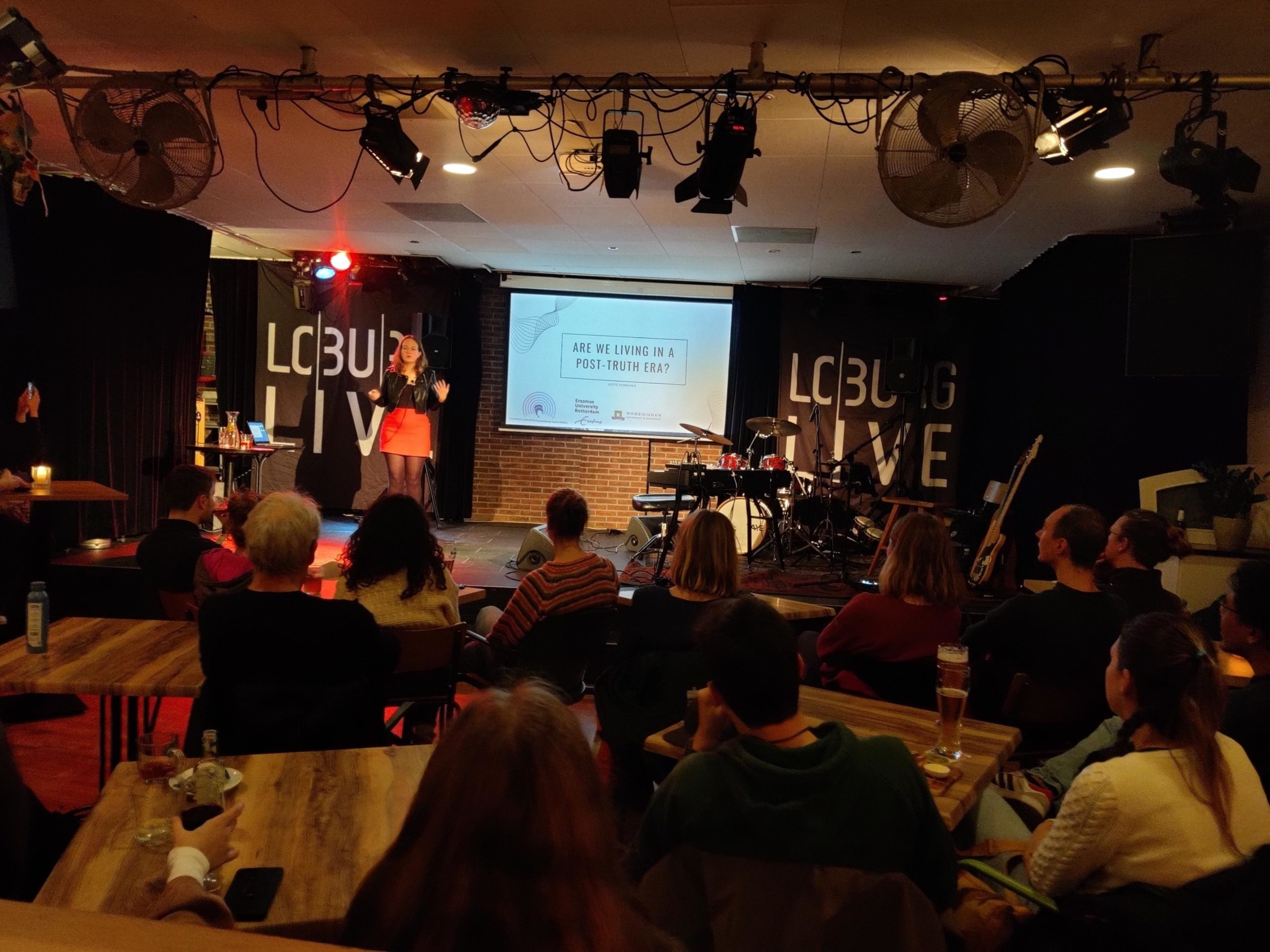Text Annemarie Haverkamp, Vox
In their pursuit of money and prestige, many researchers play fast and loose with the rules of academia. Science journalist Stan van Pelt delved into the world of research fraud, fake articles and sham conferences and wrote a book about his findings. ‘Bad data is a kind of fake news that is contaminating all of scientific literature.’
If there’s one thing Stan van Pelt can’t stand, it’s people using sports metaphors to talk about science. Like Dutch Research Council president Marcel Levi, who in a column published in 2021 compared science to ‘top-level sport’. Other researchers use terms like ‘Champions League’. But scientists, Van Pelt points out, are not elite athletes. ‘It’s not about the individual performance of one researcher, it’s about the collective.’
Something is rotten in the world of academia, and this rot is exposed by Van Pelt, a journalist and former researcher, in his book Sloppy Science, due out later this week. Much of the carelessness and fraud he describes can be traced directly to the cut-throat culture that has dominated science for far too long. Major awards like the Nobel Prizes and the Dutch Spinoza Prizes are awarded to individuals, not research groups. ‘The word prize says it all’, Van Pelt explains. ‘As if a grant is a prize to be won. No, it’s a sum of money you get for your research.’
The word prize says it all. As if a grant is a prize to be won. No, it’s a sum of money you get for your research.
For his book, Van Pelt delved into well-known fraud cases (such as the story of Diederik Stapel), published a fake article written by AI to show how easy it is to get nonsense past an editor, and attended a fake conference in Budapest – complete with real professors and bottles of water on the tables. Spanning over 300 pages, the book reveals how some scientists are willing to cross ethical boundaries in the battle for scarce research funding and limited career opportunities, and undermining the credibility of the academic community in doing so.
Has academia ever been free of this kind of corruption?
‘Probably not entirely – there’s corruption in every industry. But I do think that things have gotten a bit out of hand in the last 25 years. With the advent of neoliberalism, state-owned companies like the national railways and the postal service were privatised. The funding system for universities also changed during this time. Whereas before they were given a fixed amount of money to spend on research as they saw fit, it became more and more common for scientists to apply for Dutch Research Council grants themselves. They did receive grants, but only after submitting highly detailed research plans.’
You write that this coincided with a dramatic increase in the number of PhD students at universities.
‘Yes, the number of PhD students increased from 7,000 in 2005 to almost twice that number in 2023. Academia used to be the domain of geeks – people who were passionate about their field – but now the PhD system has become this giant moloch. It’s a pyramid with very few permanent positions at the top and an ever-widening base of young people at the bottom, all vying for tenure. Only one out of every 20 PhD students becomes a professor, so you can imagine just how high the level of competition is. They’re all competing for jobs and money. These are perverse incentives that exacerbate all kinds of problems.’
Dodgy journals
The fact that some researchers will massage research results just to get their articles published isn’t even the biggest problem, says Van Pelt, who was a researcher for 15 years himself. Far more alarming, and insidious, is the proliferation of dodgy journals. So-called editors will approach researchers inviting them to submit an article – and to pay handsomely for the privilege. Unlike articles published by real journals, these texts are never read by a real editor or submitted for peer review. To demonstrate this, Van Pelt submitted a fully fabricated article to one of these publications earlier this year. It was printed verbatim, even though it explicitly stated that no experiment had been conducted. Researchers will go to great lengths to increase their publication output, which dodgy journals take advantage of, aided by a lack of oversight.
There are also article factories which, for a fee, will write complete papers for researchers who have no time to do so themselves, sometimes with the help of AI. Van Pelt calls these operations ‘truly criminal’. Many of them are based in non-Western countries such as Iran and China, where internal controls at universities are often inadequate or non-existent. Usually, these articles are filled with nothing but nonsense.
Why is that such a bad thing? Isn’t this a problem that needs to be addressed by academia itself?
‘Because fellow researchers don’t always know the data is fake, or that the author has fiddled with the numbers – claiming there were 100 or 1,000 subjects when there were really only ten. And these results are still included in meta-analyses, which are used to create medical guidelines, for instance. I had several conversations with Ben Mol, a Dutch professor of gynaecology at Monash University in Australia. He’s extremely angry about these kinds of practices and is trying to stop them. He said: “Women and babies are dying because we’re all just letting this happen.” Bad data is a kind of fake news that is contaminating all of scientific literature.’
How can we stop this corruption and make science healthy again?
‘First of all, my book obviously highlights excesses. A lot of things are functioning as they should, and there’s a large grey area between someone like Diederik Stapel, who fabricated entire studies, and someone who does everything by the book. But I think we should partly go back to the old funding system, so that less money is distributed through the Dutch Research Council, and more is allocated to the universities themselves. We have to get rid of a lot of these funding schemes that only last four years – the exact same length as a PhD – so that universities can give out more permanent contracts. We’re now in a situation where 56 percent of researchers have temporary contracts, and among PhD students it’s close to 100 percent, even though they do the bulk of the scientific legwork. If universities had more permanent positions to offer, competition would eventually diminish, workloads would decrease and perverse incentives to commit fraud would disappear. At the same time, you have to limit the influx of PhD students, because there are not enough places for them and society has no use for that many highly specialised people.’
In your book, you write that there should also be some kind of inspectorate for science.
‘Yes, I think we need a better monitoring system. All sorts of important professions are subject to inspection. We’ve got a Food and Consumer Product Safety Authority and a Health and Youth Care Inspectorate – why isn’t there an organisation like that for science? Every once in a while, someone could come by to ask you about your data and the analyses you’ve done. To use a sports analogy: why do cyclists use performance-enhancing drugs? Because they want to be the best, and the competition is so fierce that they end up crossing the line. Scientists also crave ‘wins’, so they push the boundaries. That’s why professional cycling now tests for drugs – every day, someone could show up at your doorstep to check your urine. We don’t need extreme measures like that in science, but it would be good if researchers were a little more scrupulous about dotting their i’s and crossing their t’s.’
Doesn’t every university have a scientific integrity committee already? And nationally, there’s LOWI.
‘Those committees don’t investigate fraud until someone sounds the alarm. Until that happens, everyone just assumes all is well. That’s exactly why Diederik Stapel was able to carry on for so long. Moreover, the decisions made by these integrity commissions are advisory in nature, so it’s up to the executive boards to decide what to do with them. My advice would be to make these decisions binding. If a scientist goes over the line, you could slap them with a two-year research ban, for instance, or you could fire them if there’s been a serious violation. That almost never happens now.’
‘But you could also introduce simple checks and balances, like a four-eyes system where every article has to be reviewed by another researcher before it’s submitted, to make sure that all the calculations and analyses are correct. Researchers often overlook minor errors in their studies because they don’t know enough about statistics.’
Trust in science
Van Pelt has also thought about the issue of fake publications, which is a major problem. To address this, he believes that serious scientific journals should react more quickly when fraud investigators, such as Ben Mol, express doubts about an article. He also thinks that academia should return to publishing its own journals. Professional associations used to have their own journals, but these have largely disappeared following the emergence of commercial publishers such as Springer Nature and Elsevier. ‘In Nijmegen, there’s Radboud University Press, which could also take on that role. In some fields, such as linguistics, researchers are already launching their own journals and refusing to do editing for commercial parties. Those are great initiatives.’
The stakes are high, according to Van Pelt. Trust in science is still robust in the Netherlands. In a new survey by the Rathenau Institute, respondents gave science an average grade of 7.4 out of 10 – higher than any of the other institutions surveyed, such as the judiciary and the House of Representatives. ‘Fortunately, science still has a strong reputation, and rightly so. But if we want to maintain that trust, we need to get more serious about addressing the sector’s dark sides.’
Before starting his career as a science journalist, Stan van Pelt (born in 1978) worked as a researcher from 2002 to 2017, including at the Donders Institute in Nijmegen and in Frankfurt. From 2019 to 2022, he was an editor at Vox, a university magazine in Nijmegen. He currently works as a freelance journalist for de Volkskrant, Vox and other publications. In 2023, he published a book on brain research, titled Hack je hersenen.
On 14 October, the Radboud Research on Science Alliance is organising a debate on the issues facing science. Speakers will include Stan van Pelt and the Dutch fraud investigator Elisabeth Bik. The event will be held in Nijmegen.

 Stan van Pelt. Foto Johannes Fiebig
Stan van Pelt. Foto Johannes Fiebig 

![[The Proposition] ‘Predatory journals burn public money’](https://www.resource-online.nl/app/uploads/2023/09/DeStelling_UK_online_1803.png)